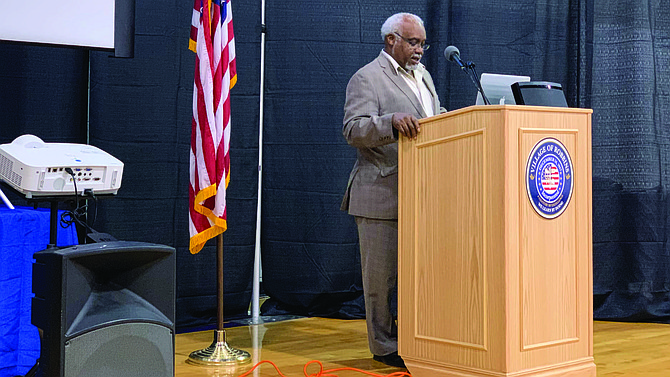VILLAGE OF ROBBINS HOSTS TOWN HALL TO ADDRESS CORONAVIRUS
Village of Robbins hosts town hall to address Coronavirus
BY TIA CAROL JONES
Tyrone Ward, mayor of Robbins, hosted a town hall meeting to provide information about the novel coronavirus as a way to answer residents’ questions and concerns. The meeting also included a presentation from Cook County Public Health Chief Operating Officer Dr. Terry Mason.
“We’re glad that you’re here to hear the information that is most pertinent for you and for us as a unit,” he said. “The goal is to be as transparent as possible when assuring the commitment toward dealing with the latest challenge that we have. My team is in position to be proactive, hence the meeting tonight. And, tweaking our own plan on a regular basis. Further, we are concerned about the entire region and willing to work cooperatively with all.”
Ward said working cooperatively is what is necessary to ride the wave. He has participated in conference calls with Chicago Mayor Lori Lightfoot, as well as Illinois Governor J.B. Pritzker.
Ward also recognized other officials from neighboring towns that were in attendance. Those included Wanda McDowell, from Markham; Bernard Ward, from Robbins; Jackie Franklin, from Cook County Commissioner Donna Miller’s office; Al Kendall from Cook County Board President Toni Preckwinkle’s office; Annie Coulter, mayor of Ford Heights; Yvonne Davis, Mayor of Dixmoor; Robert Polk, Mayor of Burnham; Christopher Clark, Mayor of Harvey. The chief of Robbins’ Fire Department and chief of Robbins’ Police Department were also in attendance.
“I am deeply appreciative of the opportunity to come and speak. It is always a pleasure to come to a place where you have regular common folk who want to learn some things. I applaud you and your team for organizing this so that we can share just a little bit,” Mason said.
Mason said while this coronavirus is new, there have been coronaviruses before – which include Severe Acute Respiratory Syndrome and Middle East Respiratory Syndrome. He said this coronavirus is called that because it is shaped like a crown.
“This particular virus that jumped from being a virus that was with an animal to a person, happened because of some human intervention,” he said.
“Most of the viruses we have come from animals. The way it happened in China, this virus was helped to be transmitted by bats. Bats who bite animals and they bite other animals. Just like when we get bitten by mosquitoes,” Mason said. “This particular virus that jumped from being a virus that was with an animal to a person, happened because of some human intervention.”
Mason cautioned people to beware of coughs and sneezes
“When you cough, or when you sneeze, those virus particles come out into your sneeze or into your cough. Those virus particles go out into the air,” he said.
He said when people walk past an area where an infected person freshly coughed or sneezed, or touched the surface, if they put it on your face and rubbed their nose, those particles can get into a person’s system.
“It doesn’t have to replicate. It attacks our cells and uses our cells to set up shop and reproduces itself,” he said. “The people we have to worry about are those people who had close contact with someone who had coronavirus, [the] elderly, especially with heart or lung problems. Any of those lung diseases will create more problems and a higher risk for you.”
A video was shown about the best way to cover a sneeze and showed how far the particles from a sneeze can travel.
“You need to not only cover your sneeze, you need to protect the way the stuff gets out around you,” Mason said. “And then of course, you obviously need to wash your hands after.”
Mason also talked about what contributes to having a healthy immune system.
“Get rest, control your sources of internal and external stress. Stress will also create a problem in your immune system.”
Mason added, to eat fruits and vegetables and drink water. He said fruits and vegetables contain antioxidants that protect and defend the lining of the blood vessels and keep them from being damaged.
Mason talked about the Three C’s: Clean your hands and any surfaces; Cover your sneeze; and Contain – stay home if you’re sick.
For more information, visit www.cdc.gov.
Latest Stories
- Comcast Launches NOW – a New Brand and Product Portfolio that Redefines Low-Cost Internet, Mobile, and TV
- Wards365 Announces Summer50 Fest on Saturday, May 18 at United Center City-Wide Resource Festival focused on Summer Activities for Youth and Families
- The Magic Of Alvin Ailey Comes To The Auditorium Theater
- BOSS Impact Funds Gives Black Women Entrepreneurs Access To Capital
- Closing the Black Maternal Health Gap Is At The Center Of Organization’s Work
- Praize Productions’ Production Shows That ‘Black Love Reigns Supreme’
- Chicago Public Schools Announces 2024-25 Preschool Application Launch
- State Treasurer Michael Frerichs Pushes to Reunite Residents with Unclaimed Property, Missing Money
- Gov. Pritzker Announces New Illinois Grocery Initiative Grant Opportunity
- MAYOR JOHNSON ANNOUNCES NEW APPOINTMENTS TO CITY COLLEGES OF CHICAGO BOARD OF TRUSTEES
Latest Podcast
Sydney Blaylock-The local skater with national experience

